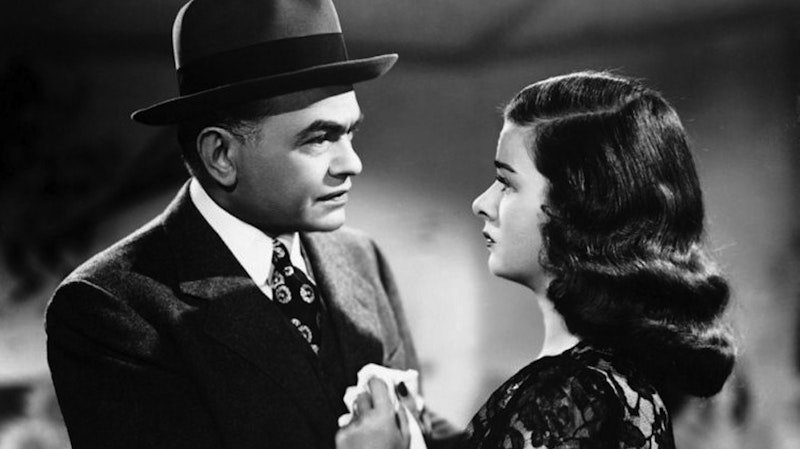We can’t be certain that any man can be driven to madness and crime but a mild-mannered and submissive man can as it’s attested by Fritz Lang’s 1945 Scarlet Street. Based on a French novel, La Chienne by Georges de La Fouchardière, the film tells the story of Christopher Cross (Edward G. Robinson), a quiet man who works as a cashier for a retail company. Everyone appears to admire Chris (as he’s known), especially his boss, who decided to honor his 25 years of service by throwing a lavish dinner, and giving Chris a watch.
As he’s going back home from the party, Chris witnesses a young woman being assaulted by a man, and comes to her rescue. Her name is Katherine “Kitty” March (Joan Bennett), and she tells Chris that she’s an actress out of work but her crassness reveals otherwise. Chris is dumb enough to believe her, and in his own way, he falls in love with her.
It’s not surprising that Chris has fallen for Kitty. She’s beautiful, albeit without any grace or class. Whatever grace and sexual intensity she projects, it’s all an act. As soon as she stops pretending, the usual crass Kitty emerges. Nevertheless, Chris sees her as a great alternative to his abusive and controlling wife, Adele, who regularly scolds, yells at, and humiliates him. (Adele’s played by Rosalind Ivan who has a very much similar role in Robert Siodmak’s 1944 The Suspect.)
Adele’s daily humiliations include her hatred for Chris’ paintings. He considers art a hobby, and paints only for the love of it. He’s relegated to the apartment’s bathroom to paint, and his daily life is punctuated by fear. Naturally, he loathes Adele but still allows her to control him.
Kitty sees an opportunity: why not use Chris to get money by pretending to love him. Although Chris isn’t exactly wealthy, he manages to give Kitty money, who promptly shares it with Johnny (Dan Dureya), the same man who hit Kitty at the beginning of the film. The pair have an abusive relationship, and what binds them together is a general taste for depravity, corruption, and swindling.
Things take a strange turn once Chris decides to bring his paintings and art supplies to Kitty’s new studio apartment. Adele threatens to trash all of his so-called art as she sees it, and Chris has to think quickly. Johnny’s trying to sell some of Chris’ paintings without his permission, but instead of getting a few bucks, he gets a visit from a famous art critic and an art dealer. They’re enthralled by Chris’ paintings, which are foolishly not signed. Johnny presents a reality very different from what it is, and claims that Kitty painted them.
Even this deception doesn’t stop Chris loving her. Instead of being angry, he’s overjoyed that his paintings are getting attention. His meekness becomes more and more irritating until Kitty blows up and tells him what a sorry case for a man he is. A crime of passion ensues yet remains free from prosecution. This, however, doesn’t stop Chris from slow but certain descent into personal madness and destitution and poverty.
In his autobiography, All My Yesterdays, Edward G. Robinson hated Scarlet Street. He writes, “[I] hastened to finish it, so monotonous was the story and the character I played. So monotonous was I as an actor.” Robinson’s self-perception wasn’t always on the mark, especially since during this period he was suspected of having Communist ties, which colored much of his outlook then and especially later in life.
Robinson’s performance in Scarlet Street is anything but monotonous. We get to see an interiority of a man who is pitied, yet impossible to like. His meekness and need to please others (whether Kitty, Adele, or his boss) becomes an occasion for evil. Chris’ inaction and submission to the will and whim of others ultimately becomes an immoral and self-serving act.
Robinson had the ability to move in between many emotional states within a single frame, and this is no exception. Whether he tries to be dignified by the way he dresses or is a pitiful excuse for a man in a woman’s apron as he follows Adele’s command to wash the dishes, Robinson’s Chris is a man whose life seems to be already planned out. He’s a failure in every sense of the word. He’s even unsuccessful in committing suicide. Instead, he’s doomed to roam the streets of New York, passed over by others, disregarded and ignored.
As much as Scarlet Street is considered a film noir, it’s also a psychological portrait of a man who loses his dignity and respectability. We see similar elements in Lang’s M (1931). Kitty’s a femme fatale but even she is unsure on how to be one. There’s no seductive mystery anywhere in her being. Rather, we witness a vision of a criminal prepared to do whatever it takes in order to suit her needs.
In some ways, there are echoes of Josef von Sternberg’s The Blue Angel (1930): Emil Jannings plays professor Rath whose honor, dignity, and respectability is completely annihilated by Marlene Dietrich’s Lola Lola. By the time Lola Lola has squeezed one last ounce of dignity out of him, there’s nothing left but poverty and death.
It’s difficult to have compassion either for professor Rath or Chris Cross. Perversely and paradoxically, Chris is the creator of his own destiny. The shadow of weakness, submission, and vapidity follows him around until the end. Yet the end never quite arrives for Chris since he’s the prisoner of his own anger, bitterness, and an inability to claim his own personhood.

